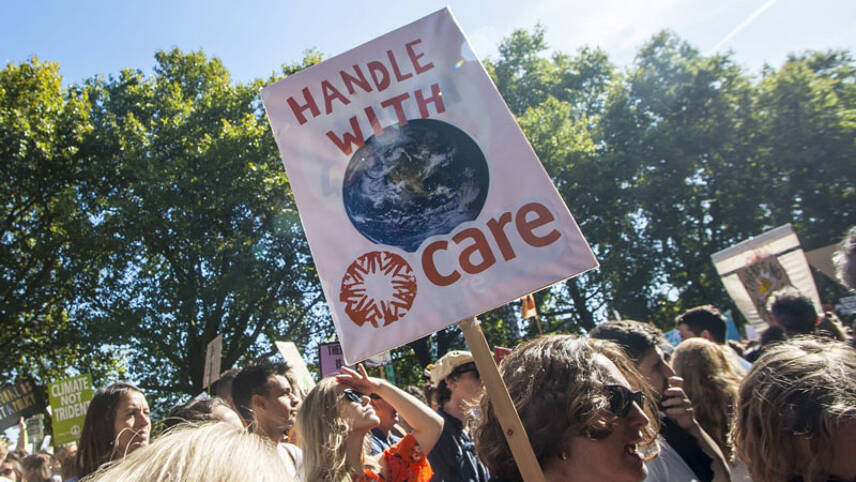Register for free and continue reading
Join our growing army of changemakers and get unlimited access to our premium content

Image: CARE International
That is the warning being issued by international NGO CARE as Ministers meet in Bonn for key climate talks that are setting the scene for this year’s UN climate summit, in Dubai this winter.
CARE has this week published analysis tracking plans for scaling international climate finance from rich nations to poorer ones, thus assessing their progress towards a pledge to deliver $100bn a year. This pledge was first announced in 2009 and formally ratified in 2015. The full $100bn per year has not yet been delivered in any given year.
Wealthy nations had stated an intention to reach the $100bn mark by 2023, but the actual amount, CARE is warning, is likely to stand at around $83bn.
Nations have had to grapple with the economic fallout of the pandemic and with the repercussions of the Russia-Ukraine war, including high energy and fertiliser prices. But CARE’s report also speaks to other blockers of progress, including a lack of planning and “widespread” over-reporting.
On the planning front, the NGO is expressing concerns that nations including Greece, Austria, Italy and Iceland have not set out detailed, quantitative information on scaling international climate finance until they deliver their fair share of the $100bn.
Most other nations that are obliged to contribute have provided some information, but very few have plans that CARE considers complete and robust. Countries deemed as providing insufficient details include Japan, Portugal and France.
On over-reporting, CARE expresses concerns about existing finance being repackaged rather than the provision of new money. The UK is a potential offender here.
CARE International’s UK head of advocacy and policy Francesca Rhodes said: “There is a serious risk that to increase climate finance in the future, the UK Government will reduce spending on other areas of the aid budget… Rishi Sunak’s government must provide greater detail to enable countries severely affected by climate change to plan ahead.”
The report also raises concerns about the funding of projects with no tangible climate benefits being counted towards the $100bn, and the provision of loans rather than grants, which can lock low-income nations into greater debt. These same issues were recently raised in a key climate finance report from Oxfam.
Imbalance in allocation
Like Oxfam, CARE’s analysis also reveals imbalances regarding where finance is flowing.
Half of the $100bn is supposed to go towards climate adaptation and the other half towards mitigation. Regardless of how steeply emissions are cut now, scientists have warned that more investment will be needed for adaptation due to climate-related changes that are already baked in.
CARE estimates that just 24% of the international climate finance provided between 2016 and 2020 went towards adaptation. It is not satisfied that sufficient plans are in place to increase this proportion to 50% this decade. The NGO would also like to see the historic imbalance between adaptation and mitigation funding addressed, meaning that the 50% threshold should be exceeded for a time.
Rhodes said: “At COP28, Rishi Sunak and other world leaders must finally take action and produce a roadmap setting out how adaptation funding will at least double by 2025. There is no room for error.”
COP28 begins in Dubai on 30 November and will run for two weeks. The climate intercessional meetings in Bonn, which conclude later this week, will help to set the foundations for negotiations. The theme so far has certainly been scrutiny of the UAE’s position as host, given its fossil fuel interests.
Global Shield Solutions Platform
In related news, a new financing vehicle to help developing nations address loss and damage funding has launched this week.
The Global Shield Solutions Platform is a multi-donor grant facility including public, private and multilateral development funding from the G7. The money will provide better-coordinated finance to the world’s most climate-vulnerable 20 nations (V20)
The architects of the new platform have promised more rapid fund allocation through vehicles including regional risk pools and contingency funds. It will also offer loans that have terms accounting for the possibility of natural disasters and extreme weather.
Frankfurt’s School of Finance and Management is managing the Platform. In the first instance, Germany, France and Denmark will be contributing.
V20 finance advisor Sara Ahmed called the platform “a hallmark of collaboration among the climate-vulnerable economies and advanced economies”.
Ahmed added: “The platform is a recognition that it would be unfair to let climate-vulnerable economies whose people are least responsible for the crisis carry the risk of rapidly crumbling cliffs of financial and social protection. [It] brings new resources to leverage the full potential of the pre-arranged finance toolkit to accelerate the building of protection systems.”


This comment has been removed by the commenter.